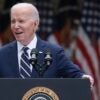The Wall Street Journal reported on Wednesday:
“… FedEx may cancel plans to buy as many as 30 new Boeing planes should Congress pass a bill that would remove truck drivers, couriers and other employees at FedEx’s Express unit from the jurisdiction of the federal Railway Labor Act of 1926, the law which today also governs labor organizing at U.S. airlines…
“It is exceedingly unlikely that we would purchase those airplanes” should Congress change the law, said FedEx spokesman Maury Lane. The legislation could cripple the company and eliminate the need for the extra planes, Mr. Lane said.
Read that again. “The legislation could cripple the company and eliminate the need for the extra planes.” Boeing, and manufacturers of major products like it, drive the American economy to a great degree. Just look at this piece from a few pages later for proof:
Anybody looking to gauge the success of government plans to restart the economy might want to track durable goods.
The Commerce Department on Wednesday releases data on new orders in February for long-lasting goods such as cars and washing machines. Economists think durable-goods orders fell for a seventh month — an unusually consistent performance for a volatile data series. The last such losing streak came in 1974-75.
February’s weakness can partly be chalked up to a screeching halt in orders for Boeing aircraft — the company landed a whopping four orders last month, compared with 125 the year before.
Perhaps the the co-sponsor of the bill threatening FedEx, Boeing and the entire American economy realizes the impact Congress is having on business decisions?
“That’s huffing and puffing, that’s all that is,” said Rep. Oberstar, in response to FedEx.
Perhaps not.






























